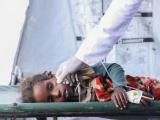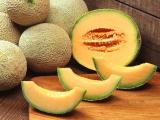Jul 22, 2004 (CIDRAP News) The investigation of an outbreak of Salmonella infections apparently linked with the Sheetz Gas Station chain in Pennsylvania and neighboring states has grown to include at least 180 cases, but the food source of contamination remained a mystery today.
The Pennsylvania Department of Health reported today that 180 cases appear to be linked with the outbreak. Newspapers have reported additional cases in West Virginia, Virginia, Maryland, and Ohio that would push the total to well over 200.
Richard McGarvey, a Pennsylvania Department of Health (PDH) spokesman, said 180 Pennsylvanians had salmonellosis and a history of exposure to Sheetz deli products. However, he said the Salmonella strain had not yet been determined for all patients, and some might have something other than the outbreak strain, Salmonella Javiana.
Pennsylvania officials announced Jul 19 that Salmonella had been found on some Roma tomatoes from a Sheetz store. Later in the day, however, analysis showed that the strain found on the tomatoes was anatum, not Javiana, McGarvey told CIDRAP News.
The Pennsylvania Department of Agriculture has tested 234 product samples from Sheetz stores and found no contaminated items other than the tomatoes, according to information on the department Web site. McGarvey said the samples tested included lettuce, cheese, and mayonnaise, as well as tomatoes.
The Roma tomatoes sold at Sheetz were distributed by Coronet Foods, based in Wheeling, W.V., Pennsylvania officials reported previously. Coronet stopped processing Roma tomatoes last week when health officials began focusing on them as the potential Salmonella vehicle, according to a report today in the Wheeling News-Register. The report quoted a Coronet official as saying the company did environmental testing in its Wheeling processing facility and found no Salmonella contamination.
McGarvey reported that all the Pennsylvanians involved in the outbreak fell ill between about Jul 1 and Jul 9. He said he couldn't specify how many cases have been confirmed to involve the Javiana strain. Some of the Pennsylvania patients were hospitalized, but no deaths have been reported, and most of the patients have recovered, he reported.
"We're doing a case-control study to see if we can determine the contaminated product," McGarvey said yesterday. "That can take several weeks. We suspect lettuce or tomatoes, some type of produce. We haven't ruled anything in or out."
The News-Register report said 18 West Virginians had outbreak-linked illness, including two people who hadn't eaten at Sheetz stores but had contact with others who had. The story said another 31 salmonellosis cases in Ohio, Maryland, and Virginia may be part of the outbreak.
The Virginia Department of Health said yesterday that it expected some salmonellosis cases in the state would be linked with the outbreak, but none had been so far.
Javiana is the fifth most common strain of Salmonella found in US outbreaks, according to the Centers for Disease Control and Prevention (CDC). In 2002, Javiana accounted for 1,188 of about 32,000 salmonellosis cases reported, or about 3.5% of the total, said CDC spokeswoman Christine Pearson.
Tomatoes are not a common vehicle for Salmonella, but they have been linked with a few outbreaks, according to CDC reports. In the summer of 2002, at least 141 people who attended the US Transplant Games in Orlando, Fla., fell ill, and the investigation pointed to diced Roma tomatoes from restaurants at the games as the source of contamination. The outbreak strain was Javiana. The CDC report on the outbreak said tomatoes had been implicated in at least one earlier Salmonella Javiana outbreak.
See also:
Jul 20 Pennsylvania Department of Health news release
http://www.dsf.health.state.pa.us/health/cwp/view.asp?a=186&q=237443
CDC report of 2002 Salmonella outbreak linked with tomatoes
http://www.cdc.gov/mmwr/preview/mmwrhtml/mm5131a2.htm
















